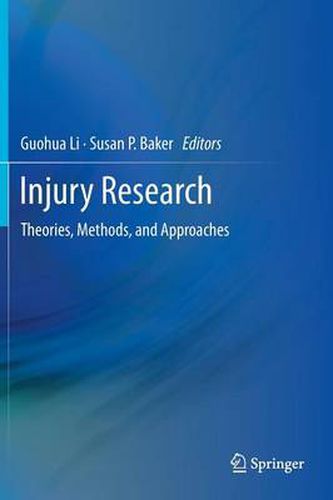Readings Newsletter
Become a Readings Member to make your shopping experience even easier.
Sign in or sign up for free!
You’re not far away from qualifying for FREE standard shipping within Australia
You’ve qualified for FREE standard shipping within Australia
The cart is loading…






This title is printed to order. This book may have been self-published. If so, we cannot guarantee the quality of the content. In the main most books will have gone through the editing process however some may not. We therefore suggest that you be aware of this before ordering this book. If in doubt check either the author or publisher’s details as we are unable to accept any returns unless they are faulty. Please contact us if you have any questions.
Injury is recognized as a major public health issue worldwide. In most countries, injury is the leading cause of death and disability for children and young adults age 1 to 39 years. Each year in the United States, injury claims about 170,000 lives and results in over 30 million emergency room visits and 2.5 million hospitalizations. Injury is medically defined as organ/tissue damages inflicted upon oneself or by an external agent either accidentally or deliberately. Injury encompasses the undesirable consequences of a wide array of events, such as motor vehicle crashes, poisoning, burns, falls, and drowning, medical error, adverse effects of drugs, suicide and homicide. The past two decades have witnessed a remarkable growth in injury research, both in scope and in depth. To address the tremendous health burden of injury morbidity and mortality at the global level, the World Health Organization in 2000 created the Department of Injury and Violence Prevention, which has produced several influential reports on violence, traffic injury, and childhood injury. The biennial World Conference on Injury Control and Safety Promotion attracts a large international audience and has been successfully convened nine times in different countries. In the United States, the National Center for Injury Prevention and Control became an independent program of the federal Centers for Disease Prevention and Control in 1997. Since then, each state health department has created an office in charge of injury prevention activities and over a dozen universities have established injury control research centers. This volume will fill an important gap in the scientific literature by providing a comprehensive and up-to-date reference resource to researchers, practitioners, and students working on different aspects of the injury problem and in different practice settings and academic fields.
$9.00 standard shipping within Australia
FREE standard shipping within Australia for orders over $100.00
Express & International shipping calculated at checkout
Stock availability can be subject to change without notice. We recommend calling the shop or contacting our online team to check availability of low stock items. Please see our Shopping Online page for more details.
This title is printed to order. This book may have been self-published. If so, we cannot guarantee the quality of the content. In the main most books will have gone through the editing process however some may not. We therefore suggest that you be aware of this before ordering this book. If in doubt check either the author or publisher’s details as we are unable to accept any returns unless they are faulty. Please contact us if you have any questions.
Injury is recognized as a major public health issue worldwide. In most countries, injury is the leading cause of death and disability for children and young adults age 1 to 39 years. Each year in the United States, injury claims about 170,000 lives and results in over 30 million emergency room visits and 2.5 million hospitalizations. Injury is medically defined as organ/tissue damages inflicted upon oneself or by an external agent either accidentally or deliberately. Injury encompasses the undesirable consequences of a wide array of events, such as motor vehicle crashes, poisoning, burns, falls, and drowning, medical error, adverse effects of drugs, suicide and homicide. The past two decades have witnessed a remarkable growth in injury research, both in scope and in depth. To address the tremendous health burden of injury morbidity and mortality at the global level, the World Health Organization in 2000 created the Department of Injury and Violence Prevention, which has produced several influential reports on violence, traffic injury, and childhood injury. The biennial World Conference on Injury Control and Safety Promotion attracts a large international audience and has been successfully convened nine times in different countries. In the United States, the National Center for Injury Prevention and Control became an independent program of the federal Centers for Disease Prevention and Control in 1997. Since then, each state health department has created an office in charge of injury prevention activities and over a dozen universities have established injury control research centers. This volume will fill an important gap in the scientific literature by providing a comprehensive and up-to-date reference resource to researchers, practitioners, and students working on different aspects of the injury problem and in different practice settings and academic fields.